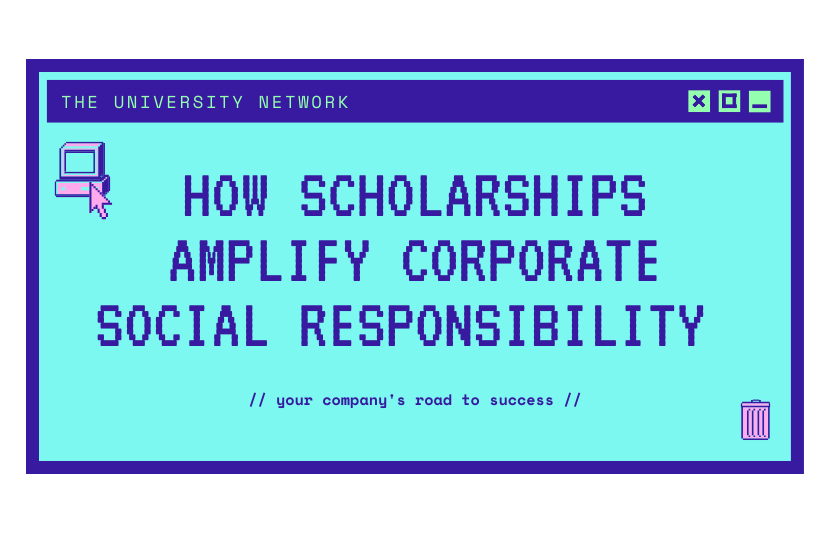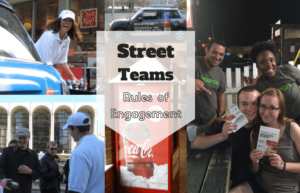Your company is one with an eye to the future and a commitment to helping the world. You place an emphasis on social accountability and are interested in building a corporate social responsibility (CSR) program to showcase your company’s commitment to helping the world.
Or perhaps your company already has a CSR program in place and you want to expand your efforts.
If either of these scenarios describes your brand, you should consider creating a scholarship to implement or expand your CSR program. Whether as a new core CSR initiative or a supplemental initiative to a robust CSR program, brand scholarships can help you get the word out about your commitment to your community — in this case, students who can use your help to earn a degree.
Scholarships provide an immediate and direct benefit to the community, and — importantly — can help spread the word about a company’s commitment to CSR quickly and effectively. Furthermore, they are a proven brand-building tool with the ability to reach thousands of students and potential applicants while benefiting the companies offering them.
The best part is, you can achieve your objective with even a modest budget.

Need help with your scholarship?
The University Network is happy to help you. Just give us a call at (917) 397-2650, or schedule a time to talk to us below:
Here’s how a brand scholarship can impact your company’s CSR program.
Scholarships as a way to implement CSR initiative
A scholarship demonstrates a brand’s commitment to education and to the future. Don’t take my word for it.
In discussing his company’s scholarship program, Peter King, senior CSR director at Rogers Communications, said: “There wasn’t much question where we would focus. Education and scholarships are a tremendously worthwhile cause, and we have this great story of a founder who believed that an educated nation is a strong nation.”
King was referring to Ted Rogers, founder and former CEO of Rogers Communications, a Canadian telecommunications company, as well as a noted philanthropist and proponent of higher education.
Rogers Communications launched the Ted Rogers Scholarship Fund in 2017, which in 2019 awarded 150 scholarships of up to $10,000 to students across Canada, and has provided $3.5 million in scholarships to 1,000 recipients since its inception. Rogers Communications has an extensive CSR agenda that also includes environmental initiatives and various charitable donations. But the company’s commitment to education via the scholarship fund and donations to grade schools forms the backbone of its program.
Another example is Taco Bell’s Live Más Scholarship. Each year, the Taco Bell Foundation awards millions in scholarships to students across the United States who submit a short video about their passion, no matter what it is and without regard for GPA and SAT scores. Part of Taco Bell’s Start With Us, Stay With Us initiative, an education and career-building program, Live Más has been so successful that Taco Bell awarded $10 million for the 2023-24 program.
Taco Bell’s initiative is a great example of a scholarship program that aligns company goals — raising brand image among young people and increasing sales — with a worthy cause. The Live Más Scholarship has increased Taco Bell’s brand awareness and image by garnering significant media attention and attracting thousands of applications every year.
In 2023, the program’s most successful year yet, nearly 14,000 students submitted applications. Moreover, in order to promote the scholarship, Taco Bell has worked with location technology company Groundtruth to create an ad campaign targeted to college students that drove over 170,000 store visits. That allowed Taco Bell to make an additional $500,000 donation to the scholarship fund due in part to increased media awareness as well as sales generated by the campaign.
Other companies have scholarships that aim to help their consumer base.
For example, L’Oréal India, a company with a consumer base that is composed largely of young women, offers an annual scholarship for economically disadvantaged young women interested in a career in science. A scholarship such as this shows that a brand is appreciative of its customers and willing to invest back in those who’ve invested in them.
Scholarships as a way to augment an existing CSR program
A 2015 study from the Kenexa High Performance Institute found that organizations that had a genuine commitment to CSR outperformed those that did not, with a return on assets 19 times higher.
Another 2015 study, conducted by Cone Communications, found that 90 percent of consumers would switch to brands that supported responsible causes and 71 percent would pay more for socially responsible goods and services, but also that 52 percent of consumers assume a company is not acting responsibly until they see proof of their CSR initiatives.
In other words, for a company to see the benefits of their CSR program, they need to effectively spread the word about their CSR initiatives to consumers.
Brand scholarships can be one of the most direct ways for a business to give back to their community. Due to increasing education costs, students are in need of financial assistance more than ever. So brand scholarships will make a real, significant impact on their lives of students around the world.
But a business offering a scholarship needs to consider how the scholarship fits into its broader CSR program and organizational goals. What are the causes that are meaningful to the company and its consumer base? What communities should the scholarship target and what are the best means to do so?
There’s no right way to answer these questions. There are diverse examples of successful brand scholarships that have taken vastly different approaches.
First and foremost, a scholarship shows that a company is interested in promoting education, but a well-designed scholarship program can also tie in other CSR goals and initiatives.
So, a company that demonstrates a commitment to environmental issues may choose to offer a competitive scholarship to candidates with a demonstrated interest in sustainability.
For example, Annie’s Homegrown, the organic food company known best for its macaroni and cheese and bunny rabbit logo, offers a sustainable agriculture scholarship for undergraduate and graduate students studying organic and/or regenerative agriculture.
And a company that is dedicated to fighting cancer can offer a scholarship for cancer survivors, as Northwestern Mutual does in its Childhood Cancer Survivor and Sibling Scholarship Program.
However, this doesn’t mean that a scholarship program necessarily must be aligned with another cause to be effective. Some of the most successful corporate scholarships, like the Coca-Cola Scholars Scholarship Program, are not tied to a specific cause.
Scholarships raise brand perception among the younger generations
A recent survey of millenial and Gen Z consumers from 42 countries around the world found that young people have a diminishing opinion of businesses and their impact on society.
The survey, conducted by Deloitte, found that only a slim majority (55 percent) believe that business has a positive impact on wider society, down from 61 percent in 2018 and four straight years of over 70 percent from 2014 to 2017.
The study states that “this showing is driven, in part, by growing views that businesses focus on their own agendas rather than considering wider society — 76 percent agree with that sentiment — and that they have no ambition beyond wanting to make money (64 percent agree).”
While the business community has some work to do to improve its standing among young people, it is clear that this is a relationship that can be improved by serious commitments to the causes close to their hearts.
The study suggests that businesses can improve their perception among young people by engaging more with social causes. Forty-two percent of millenials responded that they have “begun or deepened” a relationship with a company because they believe it has a positive impact on society.
Now consider this: millennial borrowers, ages 25-34, collectively share $497.6 billion in outstanding student debt (among 15.1 million borrowers). This is largely due to the skyrocketing cost of college, which has increased 68 percent since the 1999-2000 academic year.
And students are not receiving enough financial aid to afford college.
So, whether you are looking to implement a CSR strategy or to expand an existing program, consider scholarships as a way to help your company improve its relationships with young consumers.
Conclusion
Offering a brand scholarship is an easy way for a business to have a significant impact on a student’s life. With each scholarship granted, a student’s future gets a little brighter and the workforce gets a little stronger. This in turn brings tangential and intangential benefits to businesses.
To learn more about TUN or access its free resources, go to www.TUN.com. Also, if you are interested in starting a scholarship, read How to Start a Scholarship or check out TUN’s Scholarship Management Services.

Need help with your scholarship?
The University Network is happy to help you. Just give us a call at (917) 397-2650, or schedule a time to talk to us below:
Resources















